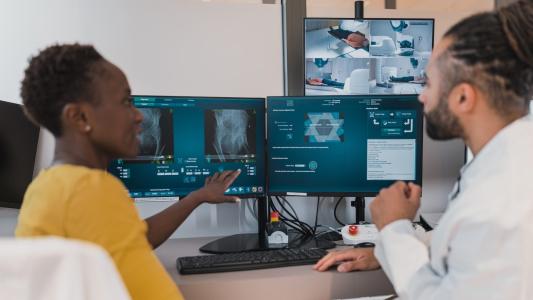In a randomized controlled trial, researchers at UT’s Dell Medical School found that a simple phone call helps relieve loneliness and depression in older people.
The trial, published in Psychiatric Services, examined the efficacy of “Sunshine Calls,” phone calls delivered by volunteers who, although trained, are not psychiatric professionals. These ordinary people could play an important role in a country whose mental health crises have outpaced its services.
“The high incidence of depression and loneliness in the U.S., combined with an extraordinary shortage of mental health professionals, means we need effective, affordable solutions to care in America,” Maninder Kahlon, study author and associate professor of population health at Dell Med, said.
Researchers found that a simple phone call helps relieve loneliness and depression in older people.
Hello, sunshine: Sunshine Calls were developed by Dell Med and Episcopal Health in their Factor Health Initiative, which looks to find ways to offer health and wellness services outside of clinics, hospitals, and other traditional settings.
First begun in 2020 to stave off loneliness in the face of the pandemic, the initial four weeks of phone calls were made to Meals on Wheels clients, and they led to “statistically significant improvements in loneliness, relative to control participants,” the study says, as well as improvement in symptoms of depression, anxiety, and overall mental wellbeing.
By definition, as Meals on Wheels clients, this first cohort had food insecurity, lower income, and had been housebound at least at some point. And while the researchers found loneliness in the group, they were not necessarily depressed.
“We wondered how much of an improvement we might see if the population studied had depression,” the authors wrote. “The answer to that question might help us understand the program’s potential to augment our health system’s capacity to address clinically relevant mental health needs.”
To find out, the researchers returned to their 2020 data, and analyzed a subset of participants who had depression.
The trial: For their original trial, the researchers enrolled 240 Meals on Wheels Clients, 58 of whom had been diagnosed with depression. Of these 240, the majority were women (79%), lived alone (56%), and were either single, divorced, or had their spouses pass away (81%). While ages ranged from 27 to 101, the average was 69 years old.
The participants in the Sunshine Calls group received calls from 16 volunteer callers, ages 17-23, every weekday for the first week, with the choice to reduce them to two or three times a week for the rest of the period. Callers received two hours of training.
“This is a low cost, minimally invasive method that builds on our essential need for human connection. It’s as simple as that.”
Maninder Kahlon
As a control, another group only received calls to assess their depression, anxiety, and loneliness at the start of the trial and the end, placed by research associates whose training was different than those making Sunshine Calls.
The researchers measure depression symptoms using a scale called PHQ-8; scores higher than 10 are considered to be clinically depressed. The team found that in patients with depression who received the Sunshine Calls, scores fell from an average of 13 to an average of 9, and perceptions of loneliness also lessened compared to the control group, who had a smaller, mean reduction of around 1 point on their scores.
The team believes that their approach could be a promising way to help overburdened mental health professionals and patients.
“This is a low cost, minimally invasive method that builds on our essential need for human connection,” Kahlon said.
“It’s as simple as that.”
We’d love to hear from you! If you have a comment about this article or if you have a tip for a future Freethink story, please email us at tips@freethink.com.






